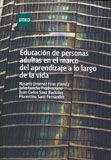


This book analyzes adult education in anthropological, sociological, psychological, pedagogical and historical terms, using current and future models of general education, professional training and sociocultural activities, outcome-based education and the validation of knowledge acquired through experience. I.T, communication, the demand for training, the ease of use and access to new technologies and their informative and communicative value all point to their significance for future education and the development of distance models. General, professional, and informal training and teaching aimed at groups such as immigrants have given rise to a helpful and diverse but disjointed service, with elements that do not respond to one single reality, that of adult intervention. By depending on various organizations and institutions it is growing increasingly divergent, without a framework of integration.
Links:
[1] http://217.160.225.169/node/1939
[2] http://217.160.225.169/node/1940
[3] http://217.160.225.169/node/1941
[4] mailto:ylazaro@pas.uned.es
[5] mailto:publicaciones@adm.uned.es
[6] http://www.uned.es/publicaciones